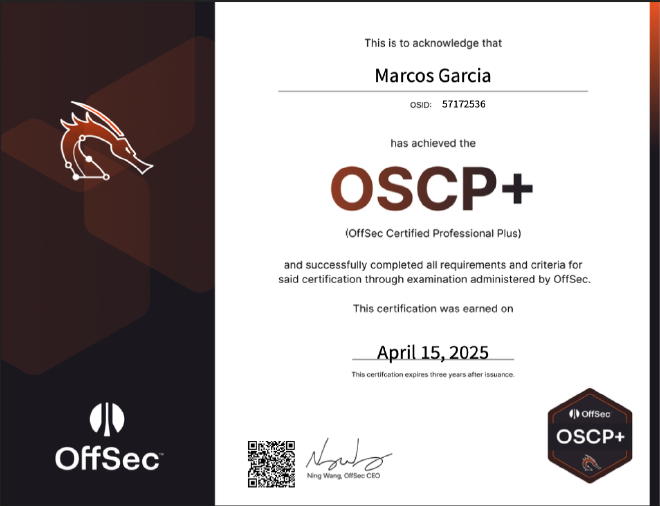I Passed the OSCP!#
I can’t describe how excited and proud I am to have completed the Offensive Security Certified Professional (OSCP) certification. It’s been one of the most challenging yet rewarding experiences in my life. This certification pushed me to my limits, tested not only my technical skills but also my mindset, patience, and discipline.

In this post, I’ll share how I prepared for the exam, what tools and resources helped me the most, and my honest review of the whole process — from the labs to the final report.
Developing the Try Harder Mentality.#
One of the most important lessons I took from the OSCP is that this exam isn’t only about technical skill — it’s about mental endurance. You’ll get stuck. A lot. And that’s fine, (most of the times at least) . What matters is how you respond to it. Staying calm, thinking methodically, learning from mistakes and pushing forward even when things feel impossible is a huge part of the process.
Another key element is taking good notes. Without solid documentation, you’re going to waste hours repeating the same steps. Personally, I used Obsidian to organize everything — from enumeration checklists to privesc tricks and one-liners. Having my own structured notes not only helped me during the labs but was absolutely essential during the exam and for writing the final report.
Creating a note-taking method not only helped me think more clearly and track my progress in hacking, but it also gave me better insight into how I learn and grow in general. Writing things down forced me to slow down and really understand what I was doing, instead of just rushing through steps. It helped me recognize patterns in my mistakes, refine my methodology, and approach problems more calmly.
Over time, note-taking became more than just a study tool — it became part of how I process information and reflect on my learning, both technically and personally, as it forces you to slow down and reflect. Using Obsidian made it easier to connect ideas, revisit past concepts, and stay organized through the entire OSCP journey.
Taking notes forces you to slow down and reflect, which is something this certification constantly requires. It helps build your methodology and gives you confidence knowing that everything you’ve learned is at your fingertips.
OSCP Preparation: What Worked for Me?#
Before I even considered going for the OSCP, I spent a lot of time on Hack The Box, solving a long list of machines to build a strong foundation. That hands-on experience helped me develop my skill set and build a solid “toolbelt” of techniques. In my opinion, experience is key, and working on CTF-style machines is essential to understand the mindset and methodology needed for certifications like the OSCP.
After that, I completed the CPTS Path from HTB Academy — in my opinion, one of the best resources out there to learn ethical hacking. It builds a solid foundation starting from zero, and for the price, it’s too good. I haven’t taken the CPTS exam yet, but the course itself gave me a strong understanding of penetration testing methodology and helped reinforce many of the core concepts I later applied during my OSCP preparation.
Once I felt confident enough, I enrolled in the OSCP (PEN-200) course. I went through the learning modules carefully, made detailed notes, and practiced the techniques on the included labs. Having the CPTS knowledge definitly helped a lot. After that, I did the Challenge Labs, which were more advanced and really pushed me to apply everything I’d learned.
To wrap up my preparation, I worked on boxes from TJ Null’s OSCP-like list for Proving Grounds to simulate the exam environment. These helped me polish my workflow and improve my speed under pressure, working on a machine per day during about 2-3 months.
Exam Day: How was It?#
The exam was definitely challenging, but not overwhelming — exactly what I expected after all the preparation. The hardest part of this test it is not just the technical ability, but the mental one. You need to stay focused, think logically, and keep your emotions in check.
In the days leading up to the exam, I made sure to stay calm and plan my approach with a clear head. Take some time to plan your meals, take rests, drink water and just stay calm! Going in with a cold, methodical mindset made a big difference — it helped me avoid panicking when things didn’t work right away (which happened several times during the test).
To make things even more interesting, I took the exam on an M3 MacBook, which added a few extra layers of difficulty with compatibility and setup. But it worked — and I’m proud of that too haha :)
It took me around 18 hours to finish both the exam and the report. I went slow and steady and relied heavily on my notes. By the end, I was mentally exhausted but proud of what I’d accomplished.
What’s Next?#
While working toward the OSCP, I discovered how interesting Active Directory environments can be — the complexity, the attack paths, the lateral movement… it really opened my eyes to how powerful and fun that side of hacking can be.
That said, I think my true passion is web hacking. I love the creativity and depth that it requires, plus being able to make a huge impact with basic tools, like a browser. My next steps are focused on learning more in that world to start developing myself in Bug Bounty Hunting a bit more, but without leaving Active Directory aside, as I’m always looking to be as versatile as possible.
With this said, this journey is far from over — OSCP was just the beginning. And remember: Try Harder!
